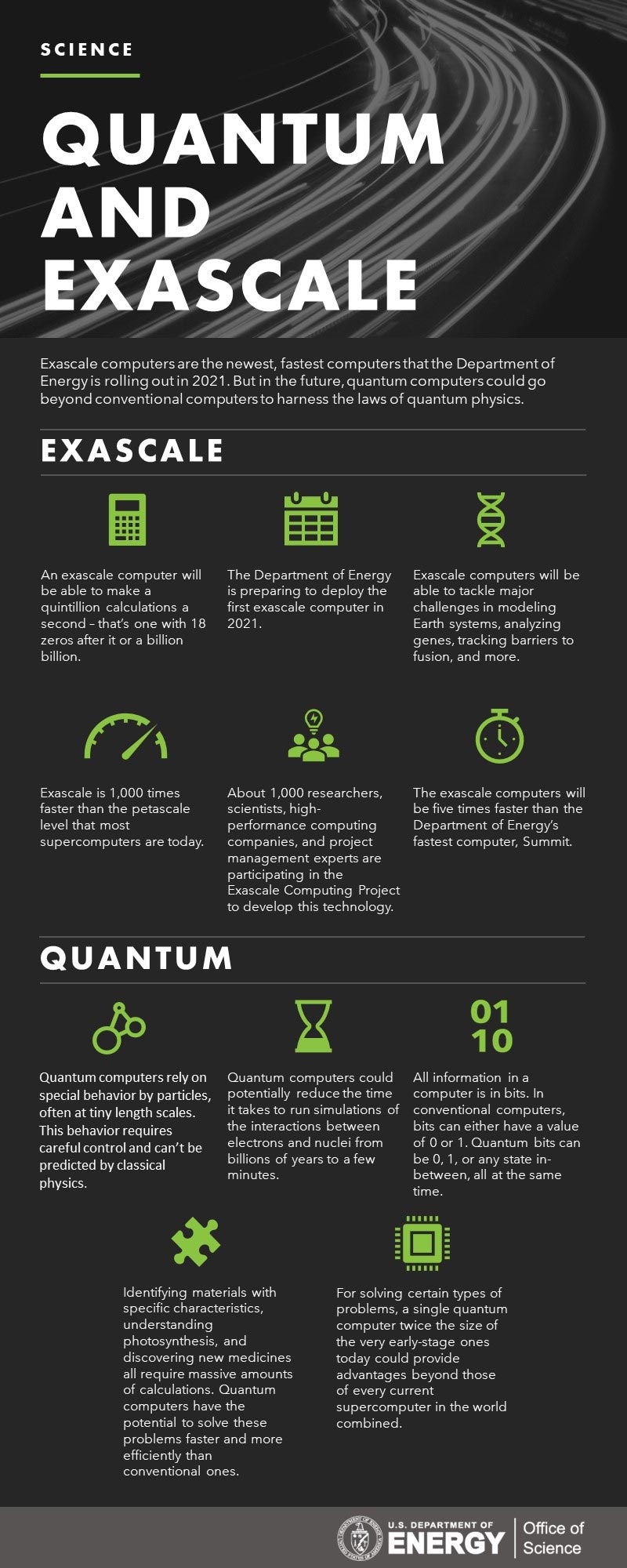
To keep qubits used in quantum computers cold enough so scientists can study them, DOE’s Lawrence Berkeley National Laboratory uses a sophisticated cooling system. Credit: Image courtesy of Thor Swift, Lawrence Berkeley National Laboratory
A quintillion calculations a second. That’s one with 18 zeros after it. It’s the speed at which an exascale supercomputer will process information. The Department of Energy (DOE) is preparing for the first exascale computer to be deployed in 2021. Two more will follow soon after. Yet quantum computers may be able to complete more complex calculations even faster than these up-and-coming exascale computers. But these technologies complement each other much more than they compete.
It’s going to be a while before quantum computers are ready to tackle major scientific research questions. While quantum researchers and scientists in other areas are collaborating to design quantum computers to be as effective as possible once they’re ready, that’s still a long way off. Scientists are figuring out how to build qubits for quantum computers, the very foundation of the technology. They’re establishing the most fundamental quantum algorithms that they need to do simple calculations. The hardware and algorithms need to be far enough along for coders to develop operating systems and software to do scientific research. Currently, we’re at the same point in quantum computing that scientists in the 1950s were with computers that ran on vacuum tubes. Most of us regularly carry computers in our pockets now, but it took decades to get to this level of accessibility.
In contrast, exascale computers will be ready next year. When they launch, they’ll already be five times faster than our fastest computer – Summit, at Oak Ridge National Laboratory’s Leadership Computing Facility, a DOE Office of Science user facility. Right away, they’ll be able to tackle major challenges in modeling Earth systems, analyzing genes, tracking barriers to fusion, and more. These powerful machines will allow scientists to include more variables in their equations and improve models’ accuracy. As long as we can find new ways to improve conventional computers, we’ll do it.
Once quantum computers are ready for prime time, researchers will still need conventional computers. They’ll each meet different needs.
DOE is designing its exascale computers to be exceptionally good at running scientific simulations as well as machine learning and artificial intelligence programs. These will help us make the next big advances in research. At our user facilities, which are producing increasingly large amounts of data, these computers will be able to analyze that data in real time.
Quantum computers, on the other hand, will be perfect for modeling the interactions of electrons and nuclei that are the constituents of atoms. As these interactions are the foundation for chemistry and materials science, these computers could be incredibly useful. Applications include modeling fundamental chemical reactions, understanding superconductivity, and designing materials from the atom level up. Quantum computers could potentially reduce the time it takes to run these simulations from billions of years to a few minutes. Another intriguing possibility is connecting quantum computers with a quantum internet network. This quantum internet, coupled with the classical internet, could have a profound impact on science, national security, and industry.
Just as the same scientist may use both a particle accelerator and an electron microscope depending on what they need to do, conventional and quantum computing will each have different roles to play. Scientists supported by the DOE are looking forward to refining the tools that both will provide for research in the future.
For more information, check out this infographic:










Can quantum computing be used to look at COVID-19 historical data and extrapolate future mutations or variations and strains for treatment?
So, i like the advancements we as a species are making, but one has to ask, how will our governments handle this power? These coders and programmers all have to think about this. Cause i see more problems then solutions. More deadly weapons, more rights lost, more control. I dont think the government anywhere in the world should have the power to know how to warp reality.
This has applications from knowing whats 10000000000000000000000 light years in any direction from us, due to entanglement. The process of birth and even death. Dreams, memories…..all accessible from one main hub. That we are all a part of. And will undoubtedly be a victim of. I know i sound crazy. But thats the world we live in. And you know it and i know it.
This, like every single other great thing will be used for the same reason. To control us. This reminds me of the movie where they can predict your thoughts. These quantum computers are smarter then us. This s#!t is about to go down. They can probably create realistic simulations with these and cern is already opening up wormholes. WTF This world is really turning into a science fiction movie. Don’t take the chip people are getting in their hands.
I agree on the dangers of having the ability & knowledge to use quantum entanglement is massive. However humans will only reach this level of knowledge through demonic forces & demonic attachment to humans as vehicles.
Hmm simce there is about half retarded comments on this article I for one will be looking forward to emterimg into a comfortable symbiosis with a quantum computer … In fact if you guys need a volunteer for human testing of nanotech or cyborg life extension new drugs …etc… heres my email [email protected]
Could quantum computing be used in the research for human longevity?
As a long time EE specializing in computer systems before retirement I find the idea behind quantum arithmetic units (not a computer as it cannot function without a classical computer controlling it) fascinating. Unfortunately the reality is operable QAs are many years away if ever. Massive signal to noise issues may make them impractical forever but I hope not.
I wish Richard Feynman could be here to help on this project